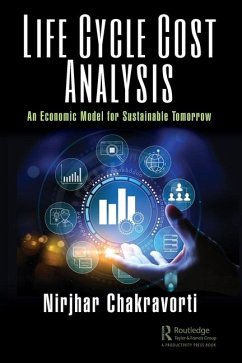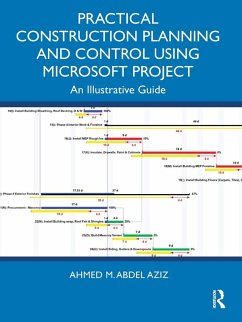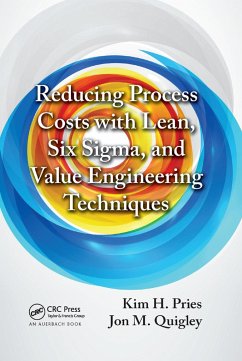Engineering Economics of Life Cycle Cost Analysis
Versandkostenfrei!
Versandfertig in 1-2 Wochen
Weitere Ausgaben:

PAYBACK Punkte
32 °P sammeln!




This book offers a systems and life cycle or total ownership cost perspective. It presents advanced costing techniques such as simulation-based costing, decision analysis, complex systems costing, software, big data, and cloud computing estimation. Examples and problems demonstrate these techniques with real-world applications.
Dr. John V. Farr is a Professor Emeritus of Engineering Management at the United States Military Academy at West Point and currently an adjunct faculty member at the University of Central Florida and the School of Business at Clarkson University. From 2010 until his retirement from West Point in 2017 he was a Professor and the Founding Director of the Center for Nation Reconstruction and Capacity Development. From 2007 to 2010 he was a Professor of Systems Engineering and Engineering Management and Associate Dean for Academics in the School of Systems and Enterprises at Stevens Institute of Technology. He was the Founding Director of the Department of Systems Engineering and Engineering Management at Stevens from 2000 to 2007. Before coming to Stevens in 2000, Dr. Farr was a Professor of Engineering Management at the United States Military Academy at West Point where he was the first permanent civilian professor in engineering and Director of their Engineering Management Program. Dr. Farr is a former past president and Fellow of the American Society for Engineering Management (ASEM) and a Fellow of the American Society of Civil Engineers (ASCE). He is a former editor of the Journal of Management in Engineering and the founder of the Engineering Management Practice Periodical. He has authored or edited over 200 technical publications which includes five books, seven book chapters, and over 90-refereed publications mainly on cost analysis, infrastructure, engineering education, engineering management, and systems engineering. Dr. Farr earned his undergraduate degree from Mississippi State University and Masters and PhD in Civil Engineering from Purdue and the University of Michigan, respectively. Dr. Farr is also a member of Chi Epsilon, a Founding Member of Epsilon Mu Eta, and Phi Kappa Phi honor societies. He is a member of the International Council of Systems Engineering, ASCE, and ASEM. He is also a registered civil engineer in Florida and Mississippi and a certified project management professional (PMP). Dr. Farr has served on numerous defense national and academic advisory boards to include membership on the Army Science Board, Army Education Advisory Committee, Board on Army RDT&E, Systems Acquisition and Logistics, and as a member of the Air Force Studies Board and the Board on Army Research and Development of the National Academies. He has served as a consultant and principal subject matter expert to numerous companies and government agencies and worked in Afghanistan, Africa, Vietnam, and the Marshall Islands on a wide variety of economic and capacity development and assessment projects. He taught at the University of Technical Education, Ho Chi Minh City, Vietnam in 2013 as a Fulbright Specialist. Isaac J. Faber is an active-duty officer in the United States Army and is the Chief Data Scientist at the Artificial Intelligence and Integration Center. Previously he completed his Ph.D. at Stanford University where his research focused on advanced techniques for cyber security, early warning of complex attacks, and the costing of complex computer systems. While at Stanford he was involved in the startup of a company focusing on managing data mining solutions. He previously served as the lead data scientist at the Army's cyber warfare unit. In that role, he guided the development and architecture of an operational cyber analytics platform. Dr. Faber also served a three-year tour at the United States Military Academy at West Point where he was promoted to the rank of Assistant Professor. At West Point he served in the Department of Systems Engineering and taught courses in decision analysis and engineering economy. He also maintained an active sponsored research program in logistics and cyber warfare. Though still an active duty Army officer, he has found time to produced four peer-reviewed journal articles, eleven peer-reviewed conference articles, and six working papers. He is a Ranger qualified combat veteran of Iraq with a Bronze Star and Combat Infantry badge. He has served as the Institute of Industrial and Systems Engineering Chair of the Engineering Economy Division. He holds degrees in Computer Information Systems (B.S) from Arizona State University, Industrial Engineering (M.S.) from the University of Washington, and Management Science & Engineering (Ph.D.) from Stanford University.
Produktdetails
- Verlag: Taylor & Francis Ltd
- 2 ed
- Seitenzahl: 412
- Erscheinungstermin: 29. November 2024
- Englisch
- Abmessung: 234mm x 156mm x 22mm
- Gewicht: 620g
- ISBN-13: 9781032184876
- ISBN-10: 1032184876
- Artikelnr.: 71908853
Herstellerkennzeichnung
Libri GmbH
Europaallee 1
36244 Bad Hersfeld
gpsr@libri.de
Für dieses Produkt wurde noch keine Bewertung abgegeben. Wir würden uns sehr freuen, wenn du die erste Bewertung schreibst!
Eine Bewertung schreiben
Eine Bewertung schreiben
Andere Kunden interessierten sich für














